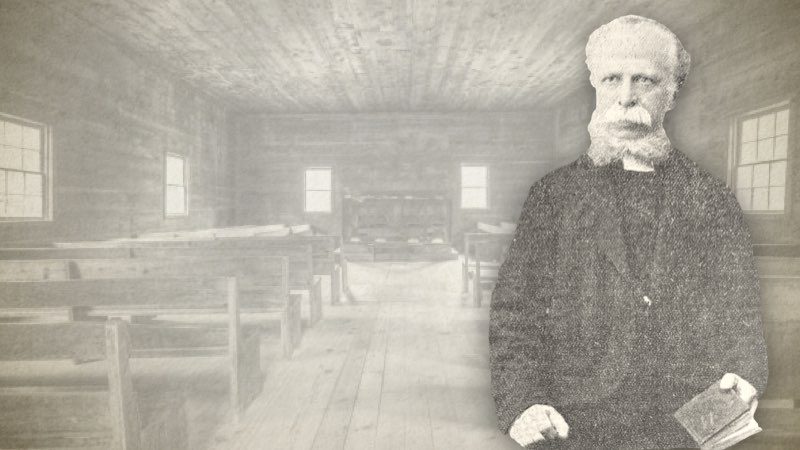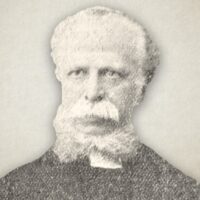
The Life And Ministry Of William Evans
Earthen Vessel 1897:
Pastor William Henry Evans, Chesham
My Dear Brother,—After long delay I comply with your oft-repented request, and send a brief outline of the way which the Lord has led me, a way in which there has been trials, losses, and sorrows, but, withal, goodness, mercy, and faithfulness, so great and constant that encourages hope to expect and faith to believe,
“That, after so much mercy past,
He’ll not let me sink at last.”
I am the offspring of God-fearing parents; my father was called by grace under the ministry of the late W. Huntington, and was for many years deacon at Gower-street Chapel, when the Church there was in the old Independent connection, and under the pastoral care of the late Henry Fowler, with whom and my father there was a very sincere and intimate friendship. In that chapel I heard, as a child, the faithful preaching of W. Gadsby, J. Warburton, E. Blackstock, and many others; but those were days when but little thought was exercised or effort made for the spiritual benefit of the young, and truth compels me to say that, beyond the testimony of my father’s godly life in his own home, I had no instruction given me in anything of a religious character. I knew there was a heaven and hell—that into the first the righteous would enter, and that the last would be the everlasting abode of the wicked. Nature’s light told me I was not among the righteous, but I did not care, and the thought of dwelling in endless misery caused me no concern; I was dead, and could not feel; blind, and did not see.
But when about 10 years old, while hearing a book read, entitled “Little Henry and His Bearer,” I was convinced of my sinfulness, felt my awfully sad state, was concerned about my prospect for eternity, and longed for that change to take place in me without which I knew that hell must be my final portion; that conviction and these desires have never left me; they have varied in degree; but, though opposed by my own ruined nature, and seducing world, and tempting devil, they have never been uprooted, they have never died.
As years increased, I became more concerned, and longed that some of the good men who preached at Gower-street (for Mr. Fowler was now dead) and those I heard afterwards at Eden-street Chapel might have something to say to me, and they did; for on one never-to-be-forgotten occasion W. Gadsby described my state and case as it was, it burnt up all my child-like creature-religion, and left me further off hope than ever. Under some others I had a little help. Mr. Easterbrook, I think, he came from Portsea, Mr. Cowper from near Brighton, and others, were at times to my young heart messengers from God of grace and mercy although at this date I cannot speak positively as to the exact way in which they helped me.
Two or three of such deserve special notice. On one occasion the late R. Luckin gave me great help; in his sermon he made use of this expression, “The Lord’s family will ever want grace; their constant cry will be, More grace, Lord, more grace.” That was just what I wanted then, and just what I want now. On another occasion the late Mr. Grace was preaching at Regent-street, City-road, from the words, “He is the Rock, His work is perfect;” that was a blessed time, the memory is still sweet: I should like to have it over again. But the greatest help I ever had in these young days was under the preaching of the late Ed. Blackstock, at Gower-street. He was speaking from “Psa. 107, and, when he came to ver. 23-29, went so exactly into all the exercises of my soul that, by the time he spoke from ver. 30, I was there also, the storm had been turned into a calm, and I was glad; because I was quiet.
But I pass over much of the same character, and now proceed to an eventful act which I took when I was about 17 or 18; it was separating myself from all the associations of my early life, in order that, as a stranger amongst strangers, I might worship God and hear His truth. Delivered entirely from influences that I knew were keeping me in bondage, with this object, I went to Bethesda Chapel, St. John’s-row, St. Luke’s; the Church there was then under the care of the late James Newborn. I went there for one object, the Lord sent me there for, another. I intended to go in and out unknown to all, and His purpose was that there I should be brought into Gospel liberty and afterwards into public work in the Lord’s kingdom. My arrangement was brought to nothing, His counsel was fulfilled and purpose established, while the writer can rejoice and say, “Bless the Lord, O my soul, and all that is within me bless His holy name.” I had help under Mr. Newborn’s ministry; but he had to leave his pulpit, and John Corbett had to take his place, and, under a sermon he preached from 1 Pet. 5:10, I had the first enjoyment of Gospel liberty; it laid a foundation in my soul for my hope that has never been swept away, and I firmly believe it never will; I felt sure that God was my portion, that heaven would be my home, and that through the covenant transactions of the Eternal Jehovah, Father, Son, and Spirit, I never should or could be lost; prayer was now turned into praise, and I could no more doubt of my interest in the everlasting love of God than I could before this believe that I had any part or lot in the matter. The Spirit was given as the Spirit of faith, and by these things I have been brought to hate the system of duty-faith. About twelve months afterwards I was baptized by Mr. Newborn and received as a member of the Church under his care.
My baptism and joining the Church was an act of faith, for by that time I had lost all my spiritual joy, darkness enveloped my mind, deadness seemed to possess my soul, while temptations fierce and many were cast into me by the adversary. But God’s work stands, it will bear testing, and where He is pleased to give a good hope, neither sin, men, or Satan can destroy it. By the sanctifying grace of the Spirit these exercises have produced in me a tenderness and sympathy for the tempted and tried, so that I have been able to speak a word in season to the weary and burdened.
While in connection with this Church, I was induced to take a class in their Sunday-school, and, while still very young, was elected superintendent, although there were male teachers in the school old enough to be my father. In this office I continued till a change in my business engagements took me away: but my membership was retained till after Mr. Newborn’s departure from the pastorate. Amongst the supplies that served the Church was William Flack, and his visit was greatly blessed to many, as well as myself. In the course of time, as no pastor had been found for the Church at Bethesda, and Mr. Flack’s ministrations became more profitable to us, about thirty members seceded from there, and jointly took Dorchester Hall, Hoxton, my father-in-law (Mr. W. Clark) and Mr. G. Sawyer becoming legally responsible for the rent, although morally we each accepted and faithfully bore our respective share of the burden. This ended in our purchasing Salem Chapel, Wilton-square, Mr. Flack being the recognised pastor; and now I, who had sought out the Strict Baptists, that amongst them I might live unknown, found myself, without the least effort on my own part, deacon in a growing, flourishing Church, teacher on the Lord’s-day of two classes, and on Monday evening of a very large class of young men and women; here God gave me great help and much success. Some of these young people have fought the fight and now possess the prize, others are still living, honourable members of Strict Baptist Churches.
The more I had of the Lord’s service the more it was loved and longed for; and, finding that God was blessing my labours in the school and my visits as deacon amongst the sick, poor, and aged, the desire for a larger sphere grew up in my heart, but it was a perfect secret between the Lord and myself for a long period, as I firmly believed that God knew where to find me, and that, when I was wanted, then He would send for me, being determined that I would not put myself into the ministry, and that no man should do it for me.
Between Mr. Flack and me there was the most intimate, unreserved friendship. I knew his private sorrows, he my personal anxieties, and in course of time I gave him a hint in reference to my exercises concerning the ministry; he gave me good counsel, and, at the close of our first interview upon the matter, made use of these words: “I shall not ask God to make you a minister, but to guide and direct you Himself, so that, if you are to be one, it may be His owing doing.” My reply was: “Thank you; that is exactly what I want.”
In the May of 1861 I preached my first sermons in Enfield, in the morning, from Rev. 1:17,18, and in the evening from Isa. 41:19,20. Very soon after this Mr. Flack and I were separated, and remained so for three or four years; but in the October of 1861 a good brother was taken ill, and sent on the Saturday asking me to supply for him at Bexley, which I did, and I look on this as my starting-point in the regular ministry of the Gospel. Since then I have preached in many parts of England, from Morley in Yorkshire to Brighton (North and South), from Yarmouth to Torquay (East and West), and, as pastor, have served the Churches in Bexley, Hounslow, Avenue (Camden Town), Courland-grove (Clapham), Rattlesden, and now I am here in Chesham. In all of them God has blessed my labours; amongst them I have had dear friends, and from them had many acts of kindness. In none had I more happiness and found kinder friends than at Rattlesden; it was a sphere of labour that was indeed after my own heart, but I left because of a few who favoured the system of duty-faith, and my conscience tells me that I have done right.
If it is the Lord’s will I should like my life to be spared a little longer, in order that I may serve His people here, who are firm in truth Scriptural in the Church order; and when my work here is done, then through the blood and righteousness of Christ, I hope to enter into heaven, there to abide as an everlasting monument of the sovereign love, irresistible power and abounding grace of the Triune Jehovah.
I am, dear brother, yours fraternally,
William Evans
Stanley-avenue, Chesham, May 5th, 1897
William Evans (?-1906) was a Strict and Particular Baptist preacher. He ministered the gospel in many parts of England and served as pastor the churches meeting in (1) Bexley, Hounslow; (2) Avenue, Camden Town; (3) Courland-grove, Clapham; (4) Rattlesden, Suffolk; (4) Chesham, Bucks. Of none had he more happiness than at Rattlesden, but due to “the system of duty-faith” imbibed by some of the members, he resigned his office and moved his membership. He had come to “hate the system of duty-faith” very early in his walk with the Lord.



